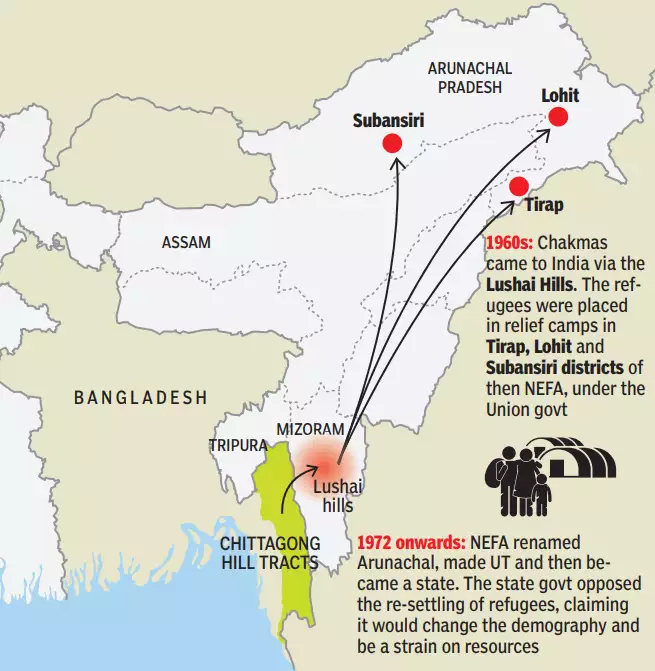Social Justice
Chakmas and Hajongs Communities
- 28 Jan 2022
- 6 min read
For Prelims: Chakmas and Hajongs Community
For Mains: Challenges faced by Chakmas and Hajongs communities and ways to address them, Laws, Institutions and Bodies constituted for the Protection and Betterment of these Vulnerable Sections.
Why in News
Recently, the National Human Rights Commission (NHRC) in its order directed Ministry of Home Affairs and Arunachal Pradesh to submit action taken report within six weeks against alledged racial profiling and relocation of the Chakmas and Hajongs from the State.
- Also both the authorities were directed to "ensure that human rights of the Chakmas and Hajongs are protected by all the ways".
- Members of the two communities have allegedly been victims of hate crime, police atrocities and denial of rights and beneficiary programmes.
Key Points
- Background:
- In 2015, the Supreme Court directed the State to grant them citizenship, but this had not yet been implemented.
- In a judgment in 1996, the Court had stated that the “life and personal liberty of every Chakma residing within the State shall be protected”.
- In light of these orders and given that most of the Chakma/Hajong community members were born in the State and have been living peacefully, the Arunachal Pradesh Chief Minister’s announcement, in August 2021, that they would be relocated outside the State and that steps would be taken for a “census” of the communities was clearly unwarranted.
- After that Chakma Development Foundation of India (CDFI) requested urgent intervention of the NHRC against racial profiling of 65,000 Chakma and Hajong tribals of Arunachal Pradesh through illegal census which was scheduled to commence from 31st December, 2021 (later plan of census was dropped) for their deportation / expulsion/ relocation from the State.
- Racial profiling is government or police activity that involves using people's racial and cultural characteristics to identify people to investigate.
- In 2015, the Supreme Court directed the State to grant them citizenship, but this had not yet been implemented.
- Issues with the Special Census:
- Chakma organisations said the census was nothing but racial profiling of the two communities because of their ethnic origin and violated Article 14 of the Constitution of India and Article 1 of the International Convention on Elimination of Racial Discrimination ratified by India.
- Article 14 says that no person shall be denied treatment of equality before the law or the equal protection of the laws within the territory of India.
- The United Nation General Assembly in October 1966 proclaimed 21st March as the International Day for the Elimination of Racial Discrimination, to be commemorated annually.
- Chakma organisations said the census was nothing but racial profiling of the two communities because of their ethnic origin and violated Article 14 of the Constitution of India and Article 1 of the International Convention on Elimination of Racial Discrimination ratified by India.
- Chakmas and Hajongs:
- Mizoram and Tripura have a sizeable population of the Buddhist Chakmas while the Hindu Hajongs mostly inhabit the Garo Hills of Meghalaya and adjoining areas of Assam.
- The Chakmas and Hajongs of Arunachal Pradesh are migrants from the Chittagong Hill Tracts of erstwhile East Pakistan, now Bangladesh.
- Displaced by the Kaptai dam on the Karnaphuli River in the 1960s, they sought asylum in India and were settled in relief camps in the southern and south-eastern parts of Arunachal Pradesh from 1964 to 1969.
- A majority of them live in the Changlang district of the State (Arunachal Pradesh) today.
- Citizenship Status:
- Out of the 65,000 Chakmas and Hajongs, about 60,500 are citizens by birth under Section 3 of the Citizenship Act, 1955, after having been born before 1st July 1987, or as descendants of those who were born before this date.
- The applications of the remaining 4,500 surviving migrants following the 1996 Supreme Court order have not been processed to date.
- The Citizenship (Amendment) Act of 2019, which amended two sections of the 1955 Act, has nothing to do with the Chakma-Hajongs since they were permanently settled by the Union of India in the 1960s.
- And since 95% of the migrants were born in the North-East Frontier Agency or Arunachal Pradesh, the Inner Line Permit mandatory under the Bengal Eastern Frontier Regulation of 1873 for outsiders seeking to visit the State, also does not apply to them.
- Out of the 65,000 Chakmas and Hajongs, about 60,500 are citizens by birth under Section 3 of the Citizenship Act, 1955, after having been born before 1st July 1987, or as descendants of those who were born before this date.
Way Forward
- The solution to the decades-old issue lies in the State respecting the rule of law and the judgements of the Supreme Court.
- There has to be an end to politicians and political aspirants deriving mileage from the Chakma-Hajong issue.







